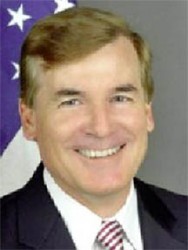After months of impasse, the Donald Ramotar administration has signed on to the USAID-funded Leadership and Demo-cracy Project (LEAD) project, having reached an agreement with the United States government.
“Our programme is back in business and we are delighted government is going to be a part of the programme… we have a diplomatic note confirming Cabinet’s approval, basically giving us the green light to continue,” United States Ambassa-dor to Guyana Brent Hardt told Stabroek News yesterday in an interview.
Head of the Presidential Secretariat Dr Roger Luncheon last November announced that government had rejected the project, which, among other goals, aims to boost citizens’ engagement with local parliamentarians and improve overall governance. He had argued that his government had no input and that any notion of consultation was really “just cosmetic.”

Both countries announced in early May that they had agreed to temporarily put the contentious project on hold to facilitate talks between the two governments. The announcement was preceded by months of rancour over the terms of the project and whether the Guyana Government had been fully consulted by Washington.
Luncheon had said that there were areas of concern with the project, including the administration’s belief that political parties could receive financial support through the project. At one point, the government revoked the work permit of the Canadian Head of the project, Glen Bradbury. However, Bradbury’s work permit will soon be restored as he will continue to lead the execution of the project.
Ambassador Hardt yesterday stated that his government was pleased that the local administration has signed on to the project as the results of the components are greater with all parties involved and consensus achieved.
He, however, informed that all aspects of the discussion on the project’s components were not completed but should wrap up this week. “We have sat down since late April to have a discussion about the programme and the Head of the Presidential Secretariat and I have had a very productive series of discussions and as a result we have come to an agreement on the core components of the LEAD programme,” he said.
“Those relating to the strengthening of parliament , civic education and preparation for local government elections…those two we have received confirmation from government that Cabinet had approved… we have not yet wrapped up the women and youth engagement piece… hopefully we will wrap up the third one during the course of this week,” the US envoy added.
Hardt echoed most of what he had been saying about the programme from its inception—that it was aimed at fostering Guyanese youth’s interest in participating in political and civic processes.
The ambassador opined that government’s denouncement of the project possibly stemmed from a lot of misunderstanding and experiences during the 1950s and 60s.
“If I have to look back… it strikes me that there is a need for maybe a bit more trust in the bilateral relationship… a lot of the misunderstandings stem from the ways Guyana’s history was rooted,” he said.
“It shaped the thinking of many that are now in government …half a century down the line and there is still a lingering suggestion that the United States is interested in which party governs,” he said.
However, Hardt said he wanted make clear that “The United States has no interest in who governs Guyana. That is entirely a matter for the people of Guyana to decide. What we do have interest in is how Guyana is governed.”
He said that his government shares common values and aspirations with Guyana and wants to see the prosperity of this nation holistically and through a democratic process where there is national consensus on issues.









